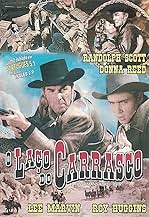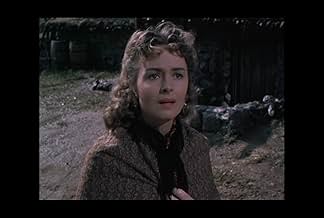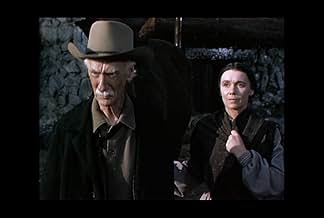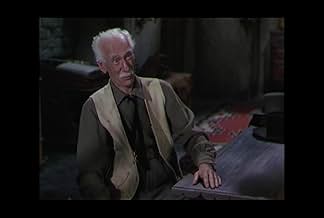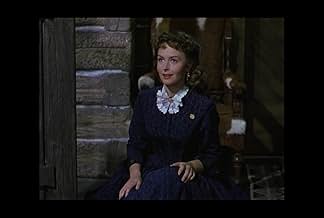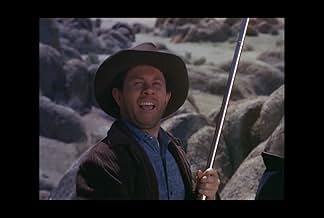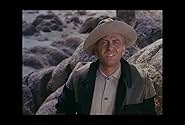IMDb RATING
6.7/10
1.9K
YOUR RATING
A Confederate Major and his troops are falsely led to believe the Civil War is not over, and become wanted men after they attack a Union Army wagon train in Nevada.A Confederate Major and his troops are falsely led to believe the Civil War is not over, and become wanted men after they attack a Union Army wagon train in Nevada.A Confederate Major and his troops are falsely led to believe the Civil War is not over, and become wanted men after they attack a Union Army wagon train in Nevada.
Edward Earle
- Union Captain
- (uncredited)
Frank Hagney
- Drifter
- (uncredited)
Reed Howes
- Hank Fletcher
- (uncredited)
Post Park
- Stage Driver
- (uncredited)
Frank Yaconelli
- Drifter
- (uncredited)
- Director
- Writer
- All cast & crew
- Production, box office & more at IMDbPro
Featured reviews
Randolph Scott leads a group of Confederate raiders who rob a gold shipment and kill the Union Cavalry escort. Before one of them dies though, he informs the group that the Civil War's been over for a few weeks. They're outlaws now.
That fact is brought home when a group of "deputies" lead by Ray Teal and Guinn Williams go out hunting the Confederates. They're not law officers in fact, but raiders looking to steal the gold and kill Scott and his crew. Scott and his crew take shelter in a stagecoach station and the fun begins.
Everybody's in conflict here. Randolph Scott has eyes for stage passenger Donna Reed and her fiancée Richard Denning doesn't like it. Lee Marvin, who's one of Scott's men, also has eyes for Reed and willing to take a direct approach. The folks who run the station, Clem Bevans and Jeanette Nolan, don't like being caught up in the shooting at their station, but don't like the Confederates in particular as their Union sympathizers and Nolan's husband and son have both been killed in the war. Even the bad guys are arguing over just what approach to take in dealing with the Confederates and none of them trust the others. All this with the two groups shooting at each other.
For 81 minutes a lot of plot is packed in and it's nicely done. Very tight editing, not a word or action wasted. Randolph Scott stands rigidly as the moral centerpiece of the film. Donna Reed, a year away from her Academy Award in From Here To Eternity, does well as a former Union Army nurse going west with her fiancée Richard Denning whom she learns is not all he seems. Lee Marvin gives a harbinger of things to come with his portrayal of a man quite ready and eager to become an outlaw.
One of Randolph Scott's best westerns.
That fact is brought home when a group of "deputies" lead by Ray Teal and Guinn Williams go out hunting the Confederates. They're not law officers in fact, but raiders looking to steal the gold and kill Scott and his crew. Scott and his crew take shelter in a stagecoach station and the fun begins.
Everybody's in conflict here. Randolph Scott has eyes for stage passenger Donna Reed and her fiancée Richard Denning doesn't like it. Lee Marvin, who's one of Scott's men, also has eyes for Reed and willing to take a direct approach. The folks who run the station, Clem Bevans and Jeanette Nolan, don't like being caught up in the shooting at their station, but don't like the Confederates in particular as their Union sympathizers and Nolan's husband and son have both been killed in the war. Even the bad guys are arguing over just what approach to take in dealing with the Confederates and none of them trust the others. All this with the two groups shooting at each other.
For 81 minutes a lot of plot is packed in and it's nicely done. Very tight editing, not a word or action wasted. Randolph Scott stands rigidly as the moral centerpiece of the film. Donna Reed, a year away from her Academy Award in From Here To Eternity, does well as a former Union Army nurse going west with her fiancée Richard Denning whom she learns is not all he seems. Lee Marvin gives a harbinger of things to come with his portrayal of a man quite ready and eager to become an outlaw.
One of Randolph Scott's best westerns.
A unit of Confederate soldiers out on a special mission attack a Union troop that is carrying a cargo of gold. The idea being that the gold will be used to better the Confederate cause, but upon finding a barely living Union survivor, they learn that General Lee has surrendered and the war finished a month prior. The men, now guilty of murder outside of war regulations, are hunted by suspect deputies, taking a stagecoach hostage and holing up at a stage line way station, inner conflicts and murderous thieves are the order of the night.
Incredible to think that this fine Western was the only effort to have been directed by Roy Huggins; because it's exactly that, damn fine. He would go on to direct notable work in TV such as The Virginian, The Rockford Files, Maverick and The Fugitive, but it seems that he wanted to put down a marker that he could in fact direct a feature length film, and although it only runs at a respectable 80 minutes, he must have been real satisfied with the finished product. Huggins is backed up by genre legend Randolph Scott in the lead role of Major Matt Stewart, with Scott providing the sort of performance that reminds us of his excellent work for Budd Boetticher in Ride Lonesome, The Tall T and Comanche Station etc. Donna Reed (lovely as ever), Lee Marvin (another fine loose cannon job), Richard Denning and Frank Faylen all beef up the cast, and although some of the other supporting players do not quite shine so bright, they do, however, earn their corn and don't harm the movie.
The film itself is structured real well, we open with a fantastic sequence as the "Rebs" attack the Union troop, with Charles Lawton Jr's photography expertly capturing the Lone Pine vista in Technicolor glory. From here we are centred inside the way station in what at first appears to be your standard Rio Bravo set up, this set up could easily have failed if the characters inside the building were dull and very uninteresting. Thankfully Huggins, who wrote the story as well as directing it, gives us characters of interest with little offshoots of conflicts to further enhance the plot. This makes for a tense build up until we lurch towards the inevitable showdown where the rouges gallery of thugs outside - who want the gold at any cost to life - plot with hungry menace.
It's not perfect by any stretch of the imagination, as some B movie traits and budgetary tone downs are evident, but the quality is still impressively high. From the direction and photography to the performances of the leads; Hangman's Knot is an essential viewing for the discerning Western fan. 8/10
Incredible to think that this fine Western was the only effort to have been directed by Roy Huggins; because it's exactly that, damn fine. He would go on to direct notable work in TV such as The Virginian, The Rockford Files, Maverick and The Fugitive, but it seems that he wanted to put down a marker that he could in fact direct a feature length film, and although it only runs at a respectable 80 minutes, he must have been real satisfied with the finished product. Huggins is backed up by genre legend Randolph Scott in the lead role of Major Matt Stewart, with Scott providing the sort of performance that reminds us of his excellent work for Budd Boetticher in Ride Lonesome, The Tall T and Comanche Station etc. Donna Reed (lovely as ever), Lee Marvin (another fine loose cannon job), Richard Denning and Frank Faylen all beef up the cast, and although some of the other supporting players do not quite shine so bright, they do, however, earn their corn and don't harm the movie.
The film itself is structured real well, we open with a fantastic sequence as the "Rebs" attack the Union troop, with Charles Lawton Jr's photography expertly capturing the Lone Pine vista in Technicolor glory. From here we are centred inside the way station in what at first appears to be your standard Rio Bravo set up, this set up could easily have failed if the characters inside the building were dull and very uninteresting. Thankfully Huggins, who wrote the story as well as directing it, gives us characters of interest with little offshoots of conflicts to further enhance the plot. This makes for a tense build up until we lurch towards the inevitable showdown where the rouges gallery of thugs outside - who want the gold at any cost to life - plot with hungry menace.
It's not perfect by any stretch of the imagination, as some B movie traits and budgetary tone downs are evident, but the quality is still impressively high. From the direction and photography to the performances of the leads; Hangman's Knot is an essential viewing for the discerning Western fan. 8/10
Released in 1952, "Hangman's Knot" tells the story of a small troop of Confederates led by Major Stewart (Randolph Scott) on special assignment in the West to apprehend gold for the Confederacy. After ambushing a Union stagecoach full of gold they find out the war has been over for a month. Desperate, they hitch a ride with stagecoach to get out of the area, but are eventually forced to hold up at a way station. Lee Marvin and Claude Jarman Jr. co-star as two of Stewart's men while Donna Reed plays a Union nurse and Richard Denning her traveling companion.
"Hangman's Knot" lacks those roll-your-eyes elements typical of too many older Westerns and benefits from a confined-location plot that's conducive to characterization. Many of the characters are corrupted by the bloody four-year war or just plain greed while some try to maintain a sense of honor amidst the madness. Despite the many deaths, the climax leaves you with a good feeling. Contrived or not, it's inspiring.
The film runs 81 minutes and was shot in Alabama Hills, Lone Pine and Ray Corrigan Ranch, Simi Valley, California.
GRADE: B
"Hangman's Knot" lacks those roll-your-eyes elements typical of too many older Westerns and benefits from a confined-location plot that's conducive to characterization. Many of the characters are corrupted by the bloody four-year war or just plain greed while some try to maintain a sense of honor amidst the madness. Despite the many deaths, the climax leaves you with a good feeling. Contrived or not, it's inspiring.
The film runs 81 minutes and was shot in Alabama Hills, Lone Pine and Ray Corrigan Ranch, Simi Valley, California.
GRADE: B
In 1865, a troop of Confederate soldiers led by Major Matt Stewart (Randolph Scott) attack the wagon of gold escorted by Union cavalry and the soldiers are killed. The only wounded survivor tells that the war ended one month ago, and the group decides to take the gold and meet their liaison that knew that the war ended but did not inform the troop. The harsh Rolph Bainter (Lee Marvin) kills the greedy man and the soldiers flee in his wagon driven by Major Stewart. When they meet a posse chasing them, Stewart gives wrong information to misguide the group; however, they have an accident with the wagon and lose the horses. They decide to stop a stagecoach and force the driver to transport them, but the posse returns and they are trapped in the station with the passenger. They realize that the men are not deputies and have no intention to bring them to justice but take the stolen gold.
"Hangman's Knot" is a simple but effective Western in the after American Civil War period mainly about lack of communication and greed. Randolph Scott and Lee Marvin in the beginning of his career perform their usual type of characters, a fair rough man and a bad character. The story is engaging with many conflictive situations and the screenplay is very tight. My vote is seven.
Title (Brazil): "O Laço do Carrasco" ("The Hangman's Noose")
"Hangman's Knot" is a simple but effective Western in the after American Civil War period mainly about lack of communication and greed. Randolph Scott and Lee Marvin in the beginning of his career perform their usual type of characters, a fair rough man and a bad character. The story is engaging with many conflictive situations and the screenplay is very tight. My vote is seven.
Title (Brazil): "O Laço do Carrasco" ("The Hangman's Noose")
Harry Joe Brown and Randy Scott produced some of the best westerns Hollywood ever made. This is one of them, one of only two films directed by the brilliant writer-producer Roy Huggins, who ended up devoting much of his time to some fine TV series, including "Maverick" and "The Rockford Files." A person can only spread himself so thin yet it's unfortunate that Huggins didn't direct more movies. There is so much highly creative work here, both on and off the screen.
The story written by Huggins concerns the final days of the tumultuous Civil War that not only split the nation asunder, but families and friends as well. Major Matt (Scott) is in command of a small band of rebel soldiers whose assignment is to hijack a union gold shipment in far off Nevada and take no prisoners. They succeed only to learn that Lee surrendered to Grant several weeks earlier. What to do? The major and his rebels decide to keep the gold and determine what to do with it later. The only rascal amongst the rebels is Ralph, an early role for Lee Marvin, who as usual steals the show. It seems his meanness has only grown as a result of all the violence he has experienced during the war. His killer proclivities have come to dominate his psyche. Though old pals in the saddle, Ralph and the Major are continually at each other's throats. Also a member of the rebels is a youngster who has not yet tasted blood, Jamie (Claude Jarman Jr. who first scored big as a twelve-year-old in "The Yearling").
As the rebels make their getaway, knowing that they will be hunted down as murderers and traitors by the Yankees, they are set upon by a gang of outlaws who claim to be seeking justice but who really want the gold. The rebels are chased to an outpost via stagecoach where they hold up in what turns out to be a standoff. The leader of the outlaw gang is Quincey, portrayed by veteran actor Ray Teal in one of his best roles. He was always a reliable actor who could be counted on to give a good performance. But this time he goes beyond the expected and turns in one of the best acting jobs ever. Today he is most famous for playing Sheriff Roy Coffee in the ever popular "Bonanza" TV series. Another surprise is to see Guinn 'Big Boy' Williams, who usually played good old boy types, half-comic, half tough guy, as one of the meanest hombres around, Smitty. He is more sadistic and cruel than Lee Marvin in this film, which is saying a lot. Sweet Donna Reed is, well, sweet, but handles the part of a nurse, Molly, engaged to a slime ball, Lee Kemper (Richard Denning of TV's Mr. North fame), beautifully. Jeanette Nolan and Clem Bevans are effective as daughter and father of a young man who died in battle after his father had been killed in the war. The lead role is filled admirably by Randolph Scott. He captures all the nuances and contradictions of Major Matt while remaining charming enough to capture the heart of Nurse Molly. The rest of the cast including the redoubtable Frank Faylen provides the necessary support for this excellent western.
The title "Hangman's Knot" is metaphoric. Literally, the knot is tied to hang Cass (Faylen), but the knot also stands for the symbolic noose around the neck of each character for various reasons explored by the interaction of a great cast.
The story written by Huggins concerns the final days of the tumultuous Civil War that not only split the nation asunder, but families and friends as well. Major Matt (Scott) is in command of a small band of rebel soldiers whose assignment is to hijack a union gold shipment in far off Nevada and take no prisoners. They succeed only to learn that Lee surrendered to Grant several weeks earlier. What to do? The major and his rebels decide to keep the gold and determine what to do with it later. The only rascal amongst the rebels is Ralph, an early role for Lee Marvin, who as usual steals the show. It seems his meanness has only grown as a result of all the violence he has experienced during the war. His killer proclivities have come to dominate his psyche. Though old pals in the saddle, Ralph and the Major are continually at each other's throats. Also a member of the rebels is a youngster who has not yet tasted blood, Jamie (Claude Jarman Jr. who first scored big as a twelve-year-old in "The Yearling").
As the rebels make their getaway, knowing that they will be hunted down as murderers and traitors by the Yankees, they are set upon by a gang of outlaws who claim to be seeking justice but who really want the gold. The rebels are chased to an outpost via stagecoach where they hold up in what turns out to be a standoff. The leader of the outlaw gang is Quincey, portrayed by veteran actor Ray Teal in one of his best roles. He was always a reliable actor who could be counted on to give a good performance. But this time he goes beyond the expected and turns in one of the best acting jobs ever. Today he is most famous for playing Sheriff Roy Coffee in the ever popular "Bonanza" TV series. Another surprise is to see Guinn 'Big Boy' Williams, who usually played good old boy types, half-comic, half tough guy, as one of the meanest hombres around, Smitty. He is more sadistic and cruel than Lee Marvin in this film, which is saying a lot. Sweet Donna Reed is, well, sweet, but handles the part of a nurse, Molly, engaged to a slime ball, Lee Kemper (Richard Denning of TV's Mr. North fame), beautifully. Jeanette Nolan and Clem Bevans are effective as daughter and father of a young man who died in battle after his father had been killed in the war. The lead role is filled admirably by Randolph Scott. He captures all the nuances and contradictions of Major Matt while remaining charming enough to capture the heart of Nurse Molly. The rest of the cast including the redoubtable Frank Faylen provides the necessary support for this excellent western.
The title "Hangman's Knot" is metaphoric. Literally, the knot is tied to hang Cass (Faylen), but the knot also stands for the symbolic noose around the neck of each character for various reasons explored by the interaction of a great cast.
Did you know
- TriviaAfter the scene of Lee Marvin holding Donna Reed against the wall, she was so terrified by him that she did not let him come near her on and off the set.
- GoofsWhen the Confederates ambush the Union gold shipment, they use dynamite. The film is set in 1865, but dynamite was not patented by its inventor, Alfred Nobel, until 1867. Dynamite was not in use during the American Civil War by either side.
- Quotes
Lee Kemper: You got 'em confused.
[Lee laughs]
Lee Kemper: They'll a-find out though and get their hands on it, there ain't gonna be nobody left alive in here to tell. You got any plans?
Major Matt Stewart: Mm-hmm. We go out shooting.
- ConnectionsReferenced in Hollywood Remembers Lee Marvin (2000)
- How long is Hangman's Knot?Powered by Alexa
Details
Box office
- Gross US & Canada
- $1,250,000
- Runtime
- 1h 21m(81 min)
- Color
- Aspect ratio
- 1.37 : 1
Contribute to this page
Suggest an edit or add missing content


